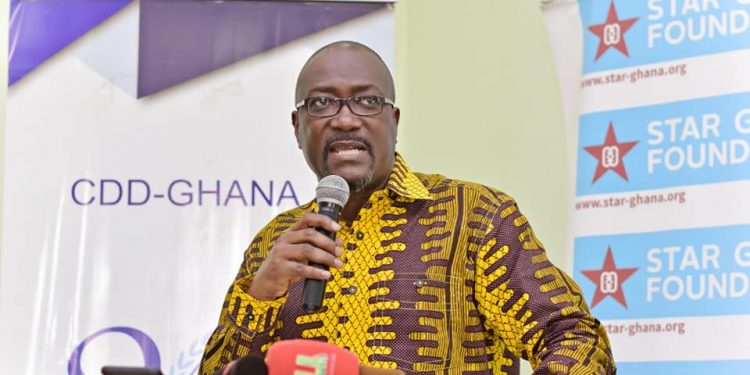Executive Director of the Centre for Democratic Development (CDD) Ghana says it’s about time the country explores other anti-corruption procedures as investments in prosecutions and prosecutorial bodies have not really paid off.
Professor Henry Kwasi Prempeh said Ghana’s over dependence on prosecutorial processes as a means of fighting corruption have not been satisfactory and thus has called for a review to include other anti-corruption procedures as well.
Speaking on JoyNews’ Newsfile Saturday, the Professor of Law said, “We have spent resources on prosecutorial bodies and various law enforcement agencies where the whole purpose of fighting corruption has been to detect it, investigate it, charge culprits if you can find them, gather evidence, launch prosecutions and hopefully get a conviction.
“If you look historically at the returns on that kind of investment certainly in Ghana, no one has to really tell you that we’ve had very little pay off from that approach to fighting corruption.”
His comment follows calls by the National Democratic Congress (NDC) and other Civil Society Organisations (CSOs) for investigations into the circumstances surrounding the controversial Agyapa deal and the prosecution of officials found culpable.
However, Professor H. K. Prempeh says prosecutions shouldn’t always be the case when fighting corruption.
He stated that the prosecutorial process does not take place within one organizational entity, “There are so many steps along the way not all of which is controlled by one entity, so who does the investigation, the detection often is different from the prosecutor who does the charging, the police, so there are many, many different entities along the line and of course, it ends in the judiciary.”
This, he said slows and sometimes impedes the fight against corruption as “at any one point somebody can drop the ball.”
He also stated that, the processes are somewhat politically mediated thus making it difficult for investigators and prosecutors to fully carry out their jobs without political interference and bottlenecks.
“So essentially we haven’t really had a good return on our investments from the approach to fighting corruption,” he said.
Thus he called on government to expand the number of tools in its anti-corruption tool kit – by including tools for the prevention of corruption.
According to him, inculcating a tool like the risk assessment tool will would entirely mitigate the occurrence of corruption by doing away with loopholes and opportunities in deals, law and even the constitution that may allow corrupt practices to fester.
He explained the risk assessment tool as, “It means that we don’t have to wait for the house to burn down before we put the fire extinguisher in it.”
He said, “When a deal is proposed or even when a piece of legislation or even a proposed constitution, it can be subjected to a corruption risk analysis because corruption though we think of it as a crime - that’s where the prosecutorial stuff comes in - it is also in a sense a crime of opportunity.
“If there are ample opportunities created within a deal, within legislation, within a particular kind of proposal for corruption to occur then the risk, the likelihood for corruption to occur is actually very high.
“So the idea here is that before you proceed with the project, before you proceed with the deal, before you proceed even with the law, you have an independent assessment of all the various ways in which corruption can enter into the deal.”
He added that when an independent assessment has been done of all the various loopholes in the deal, then a report can be drawn to show the way forward.
“So all the possible entry points, all the opportunities that are created in the deal for corruption to happen would then be looked at and then a proposal would be made as to how those loopholes may be mitigated or closed and a report then will form the basis upon which we will proceed or not proceed with the action.”
Latest Stories
-
Mahama dismayed at loss of $190m due to PDS scandal; vows to prosecute culprits
3 mins -
Limited Voter Registration: SHS students threaten to boycott exercise, return to school over registration woes
12 mins -
Government to empower universities to undertake mineral exploration – Bawumia
13 mins -
Improve your system of registration – Majority Leader to EC
21 mins -
E-cedi will be the ultimate weapon in corruption fight – Bawumia
28 mins -
Anti-LGBTQ+ bill lawsuit: Supreme Court should have given a specific date for next hearing – Dafeamekpor
31 mins -
Ghana to become first blockchain-powered government in Africa – Bawumia
34 mins -
GAF advocates for more women to be enlisted into the military
44 mins -
Fifa faces legal threat over congested calendar
46 mins -
Nobody will continue your legacy; not even Bawumia – Akufo-Addo told
55 mins -
Corruption Fight: Blockchain technology to make government data tamper-proof – Dr Bawumian hints
57 mins -
Chancellor’s Cup: KNUST play AAMUSTED in a soccer match to honour Asantehene
59 mins -
Anti-LGBTQ+ bill: AG’s request for live telecast of proceedings is in the right direction – Kweku Paintsil
1 hour -
My ex-husband stole my identity and almost had me behind bars
1 hour -
Today’s front pages: Friday, May 10, 2024
2 hours

